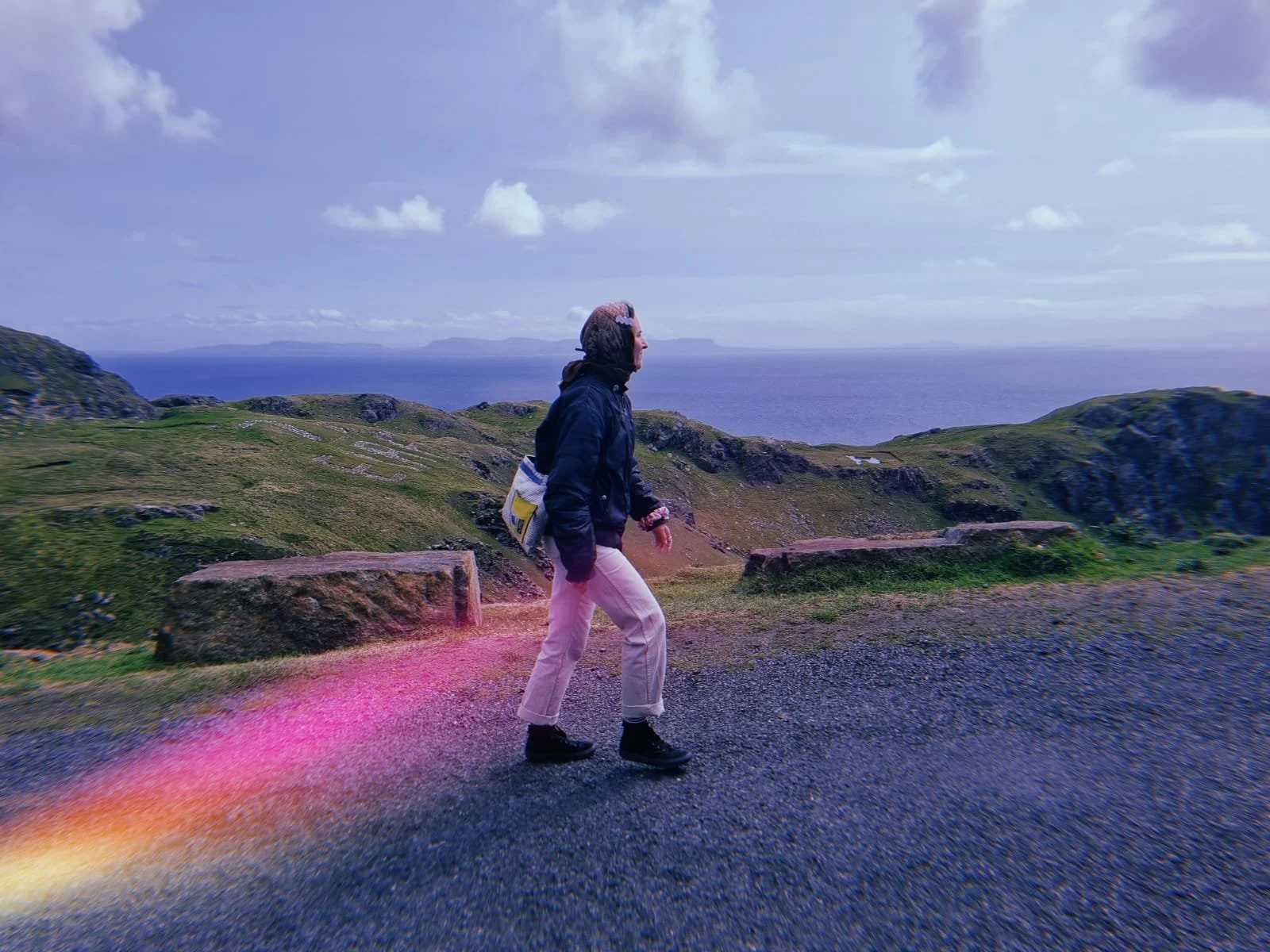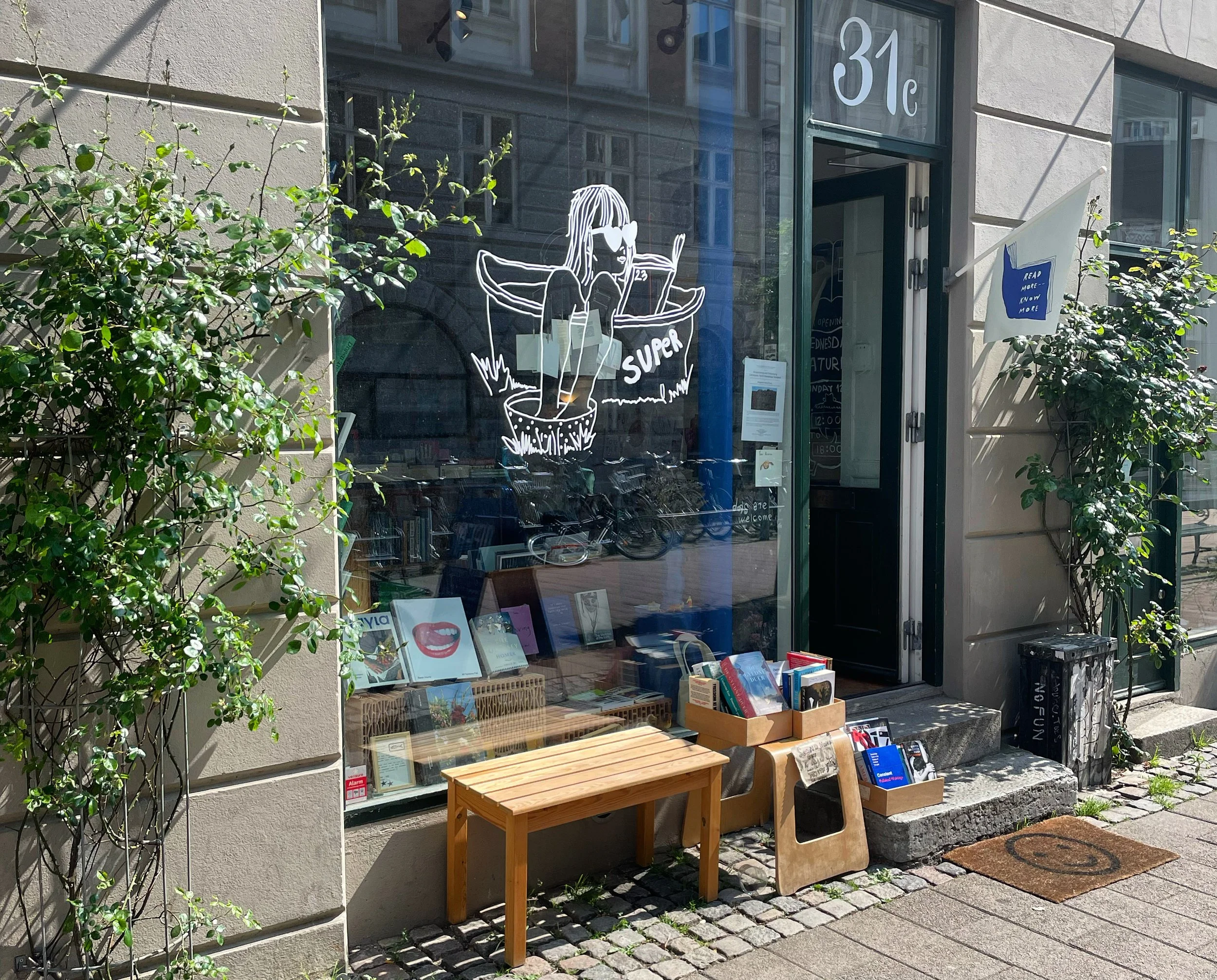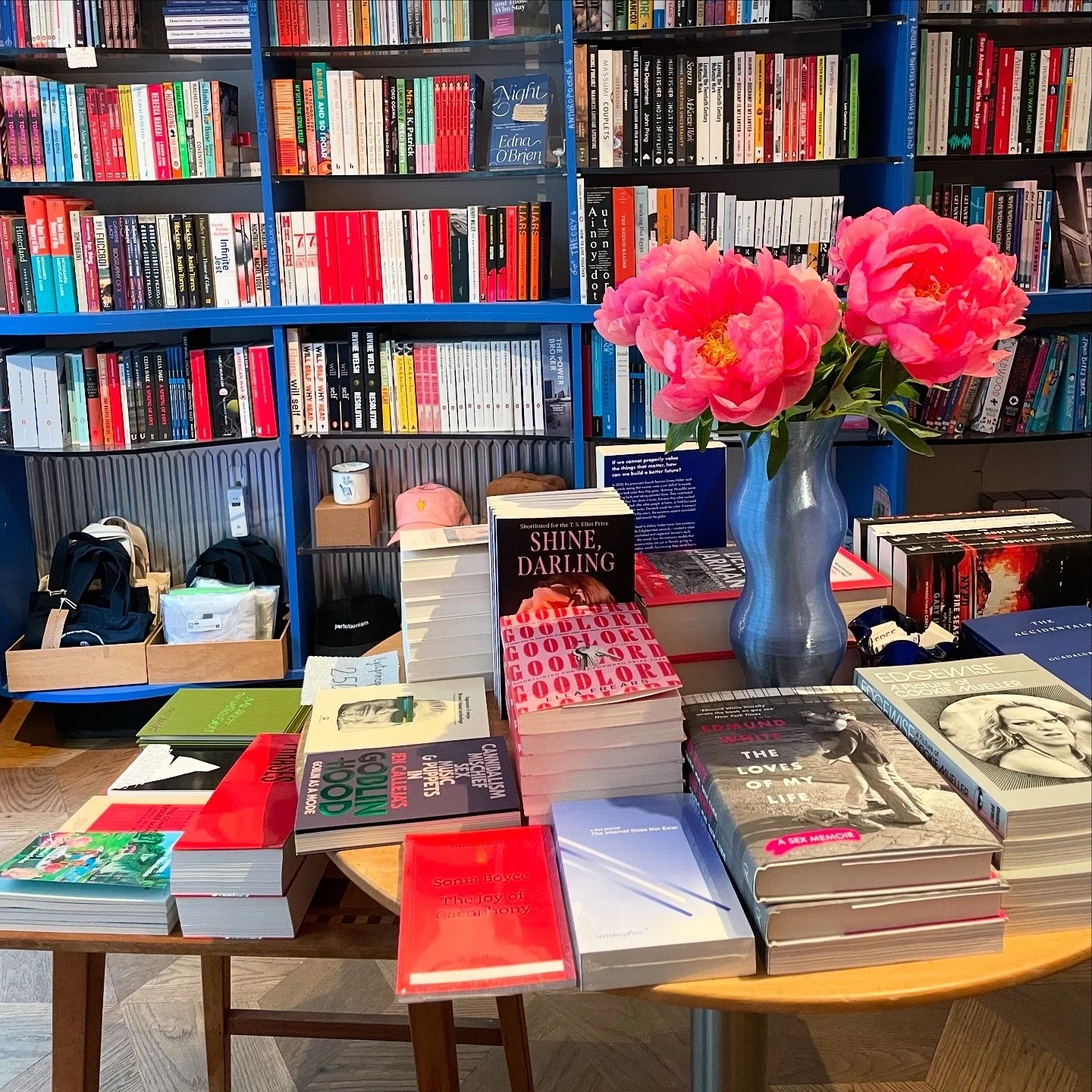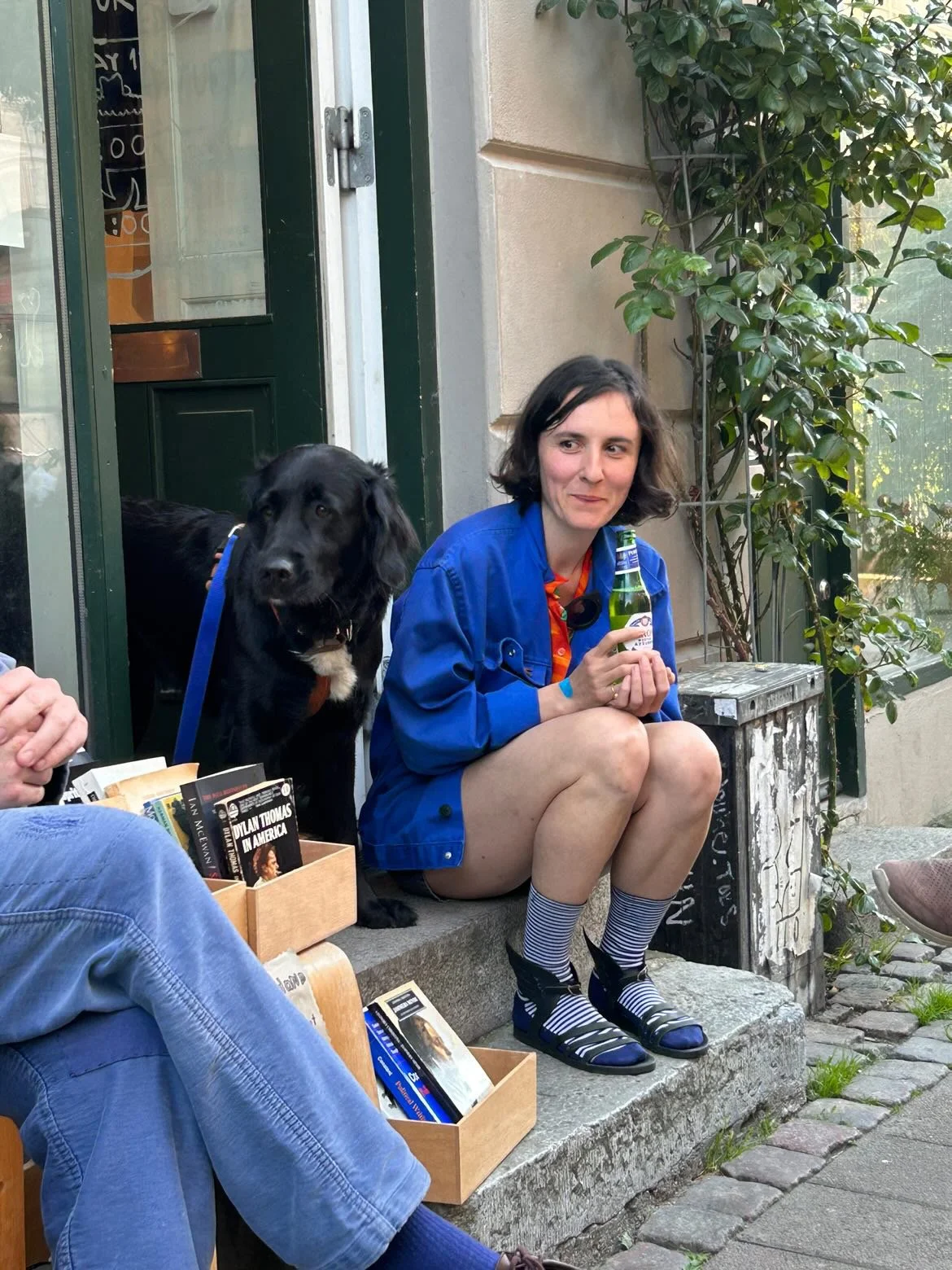A BOOKSTORE IS A SUPER IDEA
Born in Ploiești and living in Copenhagen, Letiția grew up with Urmuz & Naum between commie-chique brutal architecture. She writes, works as a substitute teacher, and takes care of a bookstore, a dog, and a beautiful child. Her book The Life of Slippery Stones is out now and we had a short talk about it, childhood and recent reading habits, the local scene in Copenhagen, how does it feel to run SUPeR Bookstore, to publish under Supertime Books and why does she do it.
Reading habits + LIFE AS a kid
My days now are short-long, I am travelling by train from Copenhagen to Ploiesti. When I sleep, I sleep well, when I don’t sleep well, at least I’m awake. At the moment I’m reading Anne Carson The gender of sound and yesterday I read The cost of living. I like Deborah Levy a lot, she sprinkles everything with interesting anecdotes and references, she mentions things and then comes back to them fifty pages later, closing the loop. She seems more interested in the experience of being, rather than the story of what happened. I like that emotional poetics a lot about a book.
My most prized book is an italian copy of Miller’s Black Spring. It’s pink and glossy and it contains the story of Jabberwhorl Cronstadt. When I first read it, maybe twenty years ago, it made me tumble like I’ve been caught by a tiny wave one meter away from the shore and it kick-rolled me in the sand. It’s also quite silly. A good book about love is Barthes’ A lover’s discourse. Fundamental for all stages of love. A good beach book is Solenoid. Hard outside and soft inside. A well made book that I own is Gellu Naum Opere, but maybe it’s just the content. From a design perspective, I really like Globus, I dig that hole through the book that symbolizes the knot in the throat of the author and I think it’s so cool that you can wear it. :)
I’m greedy with reading and the bookstore feeds my greed. I say to myself that all I want to read is linked to how well I will be able to understand what books I chose for the bookstore. I drop (almost) any book that doesn’t catch me right from the start like an emotionally unavailable person after three dates. I recently read Deficit by Emma Holten, a book about feminist economics. It gave me a framework for a lot of scattered thoughts about work/care work, and it put into historical context the rottenness of capitalism and the sickness of the patriarchal system. I recently discovered Omar el Akkad, but the most influential author for me has been Beckett, no doubt. I like the poetry of Ella Frears and Max Brett.
When I was little and we were having guests, my dad would be in the bedroom, reading. They had a lot of books, some in their bedroom, some in the living room, locked behind glass! That part in the book where Oana is in her parents' bedroom reading book titles upside down was a real and favorite pastime. I have a crush on BPT (Biblioteca Pentru Toti) books, my grandparents had what seemed like the whole collection. My dad read non-fiction sciency stuff, philosophical novels and science fiction. My mom read a lot of romance, period drama stuff and the occasional Sandra Brown like book, with a long title and normie-pretty fully-dressed hetero bodies on the cover.
I didn’t really read as a kid. I loved stories, I wanted to hear them. I had them on records or they would be read out loud to me. It got so painful after I learned to read in school, my mom and grandma seemed to suddenly have a problem with reading for me, like it would stunt my growth or something. I was a good beggar though, often prevailed. Now I get them from SUPeR, as part of a work exchange I am doing there.
My fantasy library would be two full walls, not sure if adjacent or opposite each other, in a room or a tiny hut. There’s big windows, a tree in front, a garden, a bit wild, warm, or rainy, bucolic scenery, a chair, not too comfortable, but definitely big enough to tuck my legs under myself. There’s snacks, I sit there all day an read, window/door open, I move to the garden then back inside. I’m alone maybe, in the evening I’m still reading, maybe a glass of martini and a cigarette, I wont cough, in this fantasy I’m a smoker and it’s not bad for me. I got carried away.
Running a bookstore in Copenhagen + the publishing scene
What led to opening a bookstore were, oh, big dreams, tiny pockets, reading Solenoid on the beach (!!), some serendipity, some courage motivated by fear, thinking that the only way to do it is if I just do it: jump in, do everything yourself, do things you have no idea about to figure out how to do them. Enjoy it while it lasts. Don’t sellout. I was kind of expecting it to not survive beyond some months, and the surprise was when it did and it was so well received. I always felt it like its own thing, like a living organism of sorts, made by the people who, one way or another, decide to link to it.
It’s really hard and scary at the beginning when you know nothing, have no money, have to pay for all those small things, and the big things, you have to figure out all the ins and outs. But it is doable and as much as I don’t like talking on the phone, it’s via phone calls with people in different institutions that I managed to solve businessy problems, they have always been so nice.
Compared to the early days, now I can kind of understand the flow, the ups and downs of a year, and that helps me accept it, kind of like with a moody friend. I ride along and love it. I think my favorite part is when the books arrive, even though I ordered them and even though I don’t get to keep them, it is so thrilling to unpack them and look at them and price them and shelf them. The hardest part is having to consider that it is also a business, figuring out how to run a business where profit or fast growth aren’t the goal, but wouldn’t it be nice to at least pay the staff? Also, understanding how money goes in and out. I still haven’t, but there’s been help along the way. I’m still panicking about the VAT bills every three months - most of the money we made that didn’t go back into the bookstore has gone to the Danish government. Firstly, I have accepted the trade-off: you won’t make money, some months not even to cover your dues, but you get to do what you want and what you love, and I am really happy about not having to answer to some profit hungry investor/boss. Before I had accepted the trade-off I would get meltdowns all the time about working so much and not being able to crack the code. There is no cow level. And it’s one day at a time, which for now feels very liberating.
The place was embraced by the community oh so touchingly well. “We really needed a place like this”, was something I heard a lot and it melted my heart into a little puddle on top of the porridge. There’s been some mention on a few cool online media outlets, not in the newspapers. I still feel there is some sort of divide between what’s Danish and what’s not - I also never tried to poke at it, maybe it’s only paper thin (is it a pun?), maybe I’m making it up. This is what you can find in the store besides books: cute frivolities, real people, sweet dogs. Depending on how much space they take, I try to bring Romanian stuff that I really like from small producers/designers.
The publishing scene here has been buzzing more than usual lately! There are some nice small independent bookstores, both in Danish and in English, there are fertile grounds for micro-publishing, there are zine fests and all, but it is all more tame than other places - I think it is a bit too comfy here, sometimes. We’ve been to Sit & Read in Romania in ‘23 with Lea’s book, but nothing since. I’m a terrible tabler, I need an activity. We published based on what came towards us and we really liked. It’s really hard to find these books for sale outside our bookstore, but maybe that’s the charm of it (I just called being bad at sales and distribution “charm”). It’s been exclusively poetry and a translation of Lea Rasovsky’s poetic most beautiful artist book. Future projects in the works are also poetry and a poetic artist book. :)
Publishing is really easy, especially because it is outsourced. All the decisions and the work before are difficult, sometimes scary and very time consuming, especially if you are working in a team: author, editors, designer. Everything else after that is a mystery to me. I guess (I’m guessing here) that having some distribution strategy can make it financially sustainable, while going more towards a sort of print on demand system could make it more sustainable from a resource standpoint. Distribution is essential, but of course this is coming from someone who can’t figure it out. Awesome if you can get a nice distributor or if you can set it up yourself with different places you click with, like Kayfa Ta is doing with Hopscotch Berlin. We sucked with the books we published. Never even tried to reach out to someone.
People coming into the bookstore always mention the handwritten notes we have on the books, which are rarely a summary, but more an account of how the books sneaked into our hearts. I’d take a meant recommendation from a fellow reader over whatever comes out of the brand’n’buck oriented culture. Blurbs on books often sound the same (“a magnificent tour de force!”) and feel tainted by some transaction.
Supertimebooks is a poor above ground publisher (I would have said underground but I don’t really think there is an underground in Denmark), who’s lazy with distribution and operates a bookstore. A bit like that climber, free solo, SUPeR is going its way, taking us all to ride with it, some people join along the way, it’s great and unpredictable. I am socially challenged and I do not go out of my way to meet and greet people just because we appear to do the same kind of thing. If supertimebooks would be a person at a party it would maybe be the person no one notices, but who notices everything. Don’t worry they’re not a serial killer.
I publish as an author, to have a cohesive-chaotic piece with traces of my humanity live a life separate from me. As a publisher, I assist an author to put a cohesive and beautiful piece with traces of their humanity out in the world, where it can live a life separate from them. I think about the books I publish like having one hundred puppies. I would like to know where each one ended up, if it gets good food and nice friends. Even though there’s a lot of publishers and bookstores I admire, I don’t know any so in-depth to say. But Freek from Set Margins is cool and so prolific, he puts out so many good books.
I write down so many things I read and love and want to keep forever. I often think of this thing that Lea Rasovszky wrote in an email exchange (that actually made it into the book Instant Masterpiece of Shit): “I just decided a long time ago that I'll only do what I want to do because there's no happiness otherwise, there are no deep breaths otherwise, there is no deep ocean otherwise.“
About the upcoming book
The Life of Slippery Stones is a mix of things. It’s a kind of i-novel (shishōsetsu), autofiction, memoirist fiction, where the memory has just been at a 24h rave. Time is not chronological, nor generous; it's circular, at times present and fantastic. It's a survivable and maybe recognizable chaos. Deborah Levy calls her trilogy a living autobiography. Reading it feels immediate, that must be the “alive” part. Finishing my book didn’t make me understand myself better, but some things hurt less, partly because of the blessing of introspection and partly because washing some life episodes with silly soap and laughing at myself was quite healing. When I saw it ready for print, I felt a rock-cloud get off my shoulders. I always dreamed of finishing something, and this was the first thing.
The book is somehow a consequence of clashing cultures and the push and pull of human nature. How are the northerners different from east-europeans?
People from the Northern countries get silent when they are uncomfortable. Small traces on their faces, if you know, you know. Their silence, skillful holding-it-in and passive-aggression terrify me. Balkans are feisty, zesty, feelings out, outpour for unnecessary things, but there’s a certain playful openness in that.
This book is also about friendships, the relationship rules, distances and emotional transactions. How did you learn to be a good friend?
By being a shitty friend. But in the relationships that stuck, there was some thread, some link, some understanding that these are lessons we give each other as gifts and we are happy to experience life together.
The story is not told in a linear way and makes you assemble this puzzle in your mind as if you are always remembering bits and pieces to justify some acts and behaviors as they happen. Do you think it’s important to be more rational or emotional in relationships?
Surely, both. What’s hard is to assess the situation when you’re in it, to feel the wave. Now you should be less of this and more of that, and actually get yourself to act that way if it doesn’t come natural.
I really liked the moments in the book about playing on the street when you were little, especially with the other kids from your grandmother’s block and the different rules for the games depending on the neighborhood. What games from your childhood are still entertaining for your daughter and how do these games travel?
Hide and seek, tag and hopscotch. I am in awe of how many children’s games travel over borders and time, and always have, even before phones and computers and all that. Who makes up those rhymes and songs and clapping-games, and how do they travel? Just mouth to mouth? They are the OG IRL memes (unit of cultural information spread by imitation), they have a life of their own.
An important part of a friendship is arguing and patching things up. There is a lot of emotional education in throughout the book. To argue is a form of art. What are your rules for a productive argument?
Depending on how heated you are, you can get yourself to apply them. My point of no return is if someone has repeated for the fourth time something that I know for certain is not true and I have already expressed three times why.
There are a lot of dreams reported in the book. What’s your take on dreams?
I love dreaming. I dream really strange stuff, meet strange people, get strange messages. I love playing with the dream material, and if I go through a dry-dream-spell it doesn’t feel good. I think my dreams are my brain’s finest work.
The characters in your story are very careful with the dose of feelings they trade between each other. Do you thing being cautious in a relationship is important or can it do more harm than good?
Depends on where it’s coming from. If its precaution based on fear, it’s bad. It’s self-censorship, it’s people pleasing, somehow. Na!-ah! If it’s precaution based on experience, a slight desire to be more tempered, for your own good, then go ahead.
Some bonds get broken between the characters. Either friendships, between neighbors, parents or lovers. What’s the nicest way to end something you don’t want to be a part of anymore?
If you really know you don’t want to be a part of something it’s easy. The hard part is to figure that out first, to make a decision, to really know what you’re feeling and follow it, incorporating all the consequences you can think of. For better boundaries start early with the story “the little girl who held NO in her arms”.
In the book we can see an involuntary x-ray of the different stages of a relationship. What do you think is the most important thing in forging a strong bond with someone?
I don’t know. I think it starts with some form of attraction, physical, emotional, some kind of initial pull experienced by both, and then a thread starts to form between them, a link, which may or may not influence their choices from there on. I think it’s the choice, choosing this other person, choosing yourself around this other person, not knowing why precisely, but just hearing that special note played on the chord between you and choosing it.
The story ends somehow unclear, blurry and in a high brightness. It feels like going blind. Through this smoke cloud the main character doesn’t see the things around her anymore, but gets a very good and clear image of herself. What do you think the characters from the book are up to now?
They went to therapy. Not Nina, she doesn’t need it, she’s holding it all together by herself. She lives in a house on a cliff, by the sea. Her friends are invited if they can carry themselves like temporary live-ins instead of needy guests.
Any short term plans, or something you are looking forward to?
I want the book launch to be done. I think it tickles my stomach, for this book to be removed from me. Goodbye, book! Like an animal I saved and now I have to release back into the wild. If we meet out there it will know my scent and not eat me.
Personal mythology
What’s something new you learned this year?
How to be a bit more quiet. I am now in phase two of the application process.
What is the most propulsiv thing that happened to you?
Mos def the sweet shop (cofetaria). (I mean the bookshop i.e. SUPeR, but my small friend Oscar called it the sweet shop and that’s how it stayed.) It gave me an almost complete outlet for my need to do stuff, creatively and sometimes repetitively.
Best place to go on holiday?
Don’t want to call it by its geographic coordinates nor by its name, but it has salty water, sun and a wild garden. A garden gnome lives there and his name is Peter. There’s an elf hut on the premises. Anything can happen.
The greatest band of all time?
Pavement. Mostly because I like how they play with words, and the overpowering bass.
Favorite film?
I’m gonna say Radu Jude’s films. He manages to glimpse under that thin layer between how everyone pretends the world to be and how it actually is, and just like in real life, when you lift the veil on people who like the pretend, it makes for some heart-warming, touching, painful but extremely funny human films.
What makes a good story good?
You can tell a story is good by how much it feels like a real story. Maybe it’s a mix of honest dishonesty, dishonest honesty and writer’s fire. I don’t care so much about narrative plot, the hero’s journey, I just want to read about glimpses of life, about the experience of being. It needs to suspend your disbelief and for the while you’re reading it, you’re in there, forgetting about other stuff, just living in it.
What was your earlies creative act?
My friend recently told my daughter this story and it’s definitely a candidate for my earliest creative act: I was about four, playing outside, really had to poop, hurried home, didn’t make it in, pooped just under my grandma’s window and when I looked it was shaped like a Christmas tree. I was pleasantly surprised, possibly proud, so I went inside to get my grandma to see. (hmm, quite a few things I wrote have shit in the title: Instant Masterpiece of Shit, Don’t cry, you shit, Girls don’t shit)
Do you have any type of collections of objects made of paper?
I collect tickets from films or places I traveled to and use them as bookmarks. I had a Mickey Mouse collection, a Bamse collection, much smaller, and there used to be this science magazine for kids where you got a big hardcover folder and you could click in each new number, but I don’t remember what it was called. I definitely bought the teenage magazine of the time, was it called Bravo?
What did you study and what were your dream jobs at 10 and 20 years old?
My bachelor was on creativity in journalism, and my master thesis (in film) was a comparative study of divergent narrative modes in story building and reception analysis. My dream job at 10 was an archeologist. At 20 I wanted to be a writer.
What’s more important, the image or the word?
Neither. They are like taste, sweet and salty. Sometimes you need sweet, sometimes you need salty. You always need water.
Softcover or hardcover?
Forever soft.
What is the opposite of fire? Water or no fire?
Fear.





